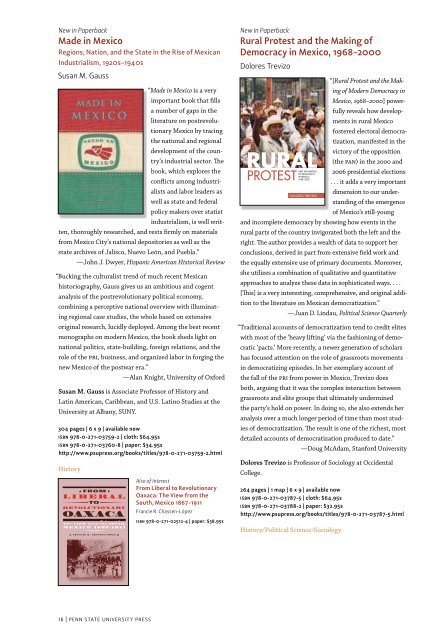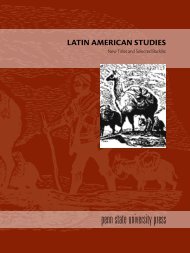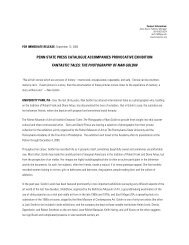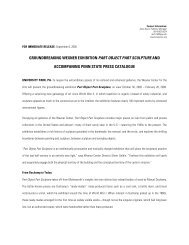Download the Catalog - Pennsylvania State University Press
Download the Catalog - Pennsylvania State University Press
Download the Catalog - Pennsylvania State University Press
Create successful ePaper yourself
Turn your PDF publications into a flip-book with our unique Google optimized e-Paper software.
ican Studies / History<br />
<strong>University</strong> <strong>Press</strong><br />
lvania<br />
CHASSEN-LOPEZ ´<br />
s<br />
recent Mexican historiography, Gauss gives us<br />
postrevolutionary political economy, combinilluminating<br />
regional case studies (of Monterle<br />
based on extensive original research, lucidly<br />
raphs on modern Mexico, <strong>the</strong> book sheds light<br />
ign relations, and <strong>the</strong> role of <strong>the</strong> PRI, business,<br />
Mexico of <strong>the</strong> postwar era.”<br />
—alan knight, university of oxford<br />
<strong>State</strong> <strong>University</strong> <strong>Press</strong><br />
ark, <strong>Pennsylvania</strong><br />
supress.org<br />
271-03759-2<br />
Chassen-López’s new study is certain to claim<br />
ional literature on modern Mexico. Finally we<br />
onomic, and political history of Porfirian modackyard!<br />
This fine volume showcases Chasseneconomy,<br />
peasant and resistance studies, and<br />
methodology.”<br />
—gilbert m. joseph, yale university<br />
d work is <strong>the</strong> most comprehensive, in-depth<br />
egion in <strong>the</strong> critically important period of econd<br />
state-building between 1880 and 1910. It<br />
gotten south’ <strong>the</strong> complexity, modernity, and<br />
ng been denied.”<br />
kay vaughan, university of maryland<br />
rk on Mexican history. The author argues that<br />
history through an analysis of <strong>the</strong> indigenous<br />
n portrayed as backward and reactionary. The<br />
rview of a key period in Oaxaca history; it is<br />
th century. One of <strong>the</strong> greatest strengths of <strong>the</strong><br />
ths and poorly documented claims that permempbell,<br />
university of texas at el paso<br />
ears of remarkable excavations in local, state,<br />
her regional history of any o<strong>the</strong>r Mexican state<br />
ey of sources. The book is encyclopedic in its<br />
t of politics and economics during <strong>the</strong> fortyunexplored.<br />
The book is at its best in its depicigenous.’”<br />
—mark wasserman, rutgers university<br />
ISBN 0-271-02370-8<br />
,!7IA2H1-acdhaa!:t;K;k;K;k<br />
gauss<br />
made in mexico<br />
Regions, Nation, and <strong>the</strong> <strong>State</strong> in <strong>the</strong> Rise of Mexican Industrialism, 1920s –1940s<br />
penn<br />
state<br />
press<br />
FROM LIBERAL TO<br />
REVOLUTIONARY OAXACA<br />
PENN<br />
STATE<br />
PRESS<br />
New in Paperback<br />
Made in Mexico<br />
Regions, Nation, and <strong>the</strong> <strong>State</strong> in <strong>the</strong> Rise of Mexican<br />
Industrialism, 1920s–1940s<br />
Susan M. Gauss<br />
“Made in Mexico is a very<br />
important book that fills<br />
The experiment with neoliberal marketoriented<br />
economic policy in Latin America,<br />
popularly known as <strong>the</strong> Washington<br />
a number of gaps in <strong>the</strong><br />
wing and populist regimes now in power<br />
literature in many countries, <strong>the</strong>re is much on debate postrevolu-<br />
should be taking, and <strong>the</strong>re are those who<br />
tionary<br />
believe that state-led<br />
Mexico<br />
development might<br />
by tracing<br />
be worth trying again. Susan Gauss’s study<br />
of <strong>the</strong> process by which Mexico transformed<br />
from a largely agrarian society into<br />
<strong>the</strong> national and regional<br />
an urban, industrialized one in <strong>the</strong> three<br />
development decades following <strong>the</strong> end of <strong>the</strong> Revolu-otion is especially timely and may have les-<br />
<strong>the</strong> country’s<br />
industrial sector. The<br />
sons to offer to policy makers today.<br />
The image of a strong, centralized corporatist<br />
state led by <strong>the</strong> Partido Revolucionario<br />
Institucional (PRI) from <strong>the</strong> 1940s con-<br />
book, which explores <strong>the</strong><br />
ceals what was actually a prolonged, messy<br />
process of debate and negotiation among<br />
conflicts industrialists<br />
nationalist project. and Made in Mexico labor focus-<br />
leaders as<br />
Regions, Nation, and <strong>the</strong> <strong>State</strong><br />
<strong>the</strong> postrevolutionary state, labor, and regionally<br />
based industrial elites to define <strong>the</strong><br />
in <strong>the</strong> Rise of Mexican Industrialism,<br />
1920s – 1940s<br />
es on <strong>the</strong> distinctive nature of what happened<br />
in <strong>the</strong> four regions studied in detail:<br />
susan m. gauss<br />
well as state and federal<br />
policy makers over statist<br />
industrialism, is well written,<br />
thoroughly researched, and rests firmly on materials<br />
from Mexico City’s national depositories as well as <strong>the</strong><br />
state archives of Jalisco, Nuevo León, and Puebla.”<br />
—John J. Dwyer, Hispanic American Historical Review<br />
“Bucking <strong>the</strong> culturalist trend of much recent Mexican<br />
historiography, Gauss gives us an ambitious and cogent<br />
analysis of <strong>the</strong> postrevolutionary political economy,<br />
combining a perceptive national overview with illuminating<br />
regional case studies, <strong>the</strong> whole based on extensive<br />
original research, lucidly deployed. Among <strong>the</strong> best recent<br />
monographs on modern Mexico, <strong>the</strong> book sheds light on<br />
national politics, state-building, foreign relations, and <strong>the</strong><br />
role of <strong>the</strong> PRI, business, and organized labor in forging <strong>the</strong><br />
new Mexico of <strong>the</strong> postwar era.”<br />
<br />
—Alan Knight, <strong>University</strong> of Oxford<br />
Susan M. Gauss is Associate Professor of History and<br />
Latin American, Caribbean, and U.S. Latino Studies at <strong>the</strong><br />
<strong>University</strong> at Albany, SUNY.<br />
304 pages | 6 x 9 | available now<br />
isbn 978-0-271-03759-2 | cloth: $64.95s<br />
isbn 978-0-271-03760-8 | paper: $34.95s<br />
http://www.psupress.org/books/titles/978-0-271-03759-2.html<br />
History<br />
made in<br />
mexico<br />
FROM<br />
LIBERAL<br />
TO<br />
REVOLUTIONARY<br />
OAXACA<br />
The VIEW from <strong>the</strong> SOUTH,<br />
MEXICO 1867-1911<br />
FRANCIE R. CHASSEN-LOPEZ ´<br />
Consensus, has run its course. With left-<br />
about what direction economic policy<br />
Also of Interest<br />
From Liberal to Revolutionary Oaxaca aims at<br />
finally setting Mexican Liberal history free of stereotypes<br />
about <strong>the</strong> sou<strong>the</strong>rn state of Oaxaca, long<br />
to Revolutionary<br />
portrayed as a traditional and backward society<br />
resistant to <strong>the</strong> forces of The modernization View and from <strong>the</strong><br />
Oaxaca:<br />
marginal to <strong>the</strong> Revolution. Chassen-López<br />
challenges this view of Oaxaca as a negative<br />
South, mirror image of modern Mexico, presenting in 1867–1911<br />
its place a much more complex reality. Her<br />
analysis of <strong>the</strong> confrontations between<br />
Mexican liberals’ modernizing projects and<br />
Francie Oaxacan society, R. especially Chassen-López<br />
indigenous communal<br />
villages, reveals not only conflicts but<br />
also growing linkages and dependencies. She<br />
portrays <strong>the</strong>m as engaging with and transforming<br />
978-0-271-02512-4 each o<strong>the</strong>r in an ongoing process of | paper: isbn $38.95s<br />
contestation, negotiation, and compromise.<br />
The book is organized in three parts. The first<br />
examines Oaxaca’s infrastructure and economy,<br />
addressing whe<strong>the</strong>r its native sons,<br />
Presidents Benito Juárez and Porfirio Díaz,<br />
neglected <strong>the</strong>ir own state in <strong>the</strong> drive toward<br />
Mexico’s modernization. The second part<br />
looks at <strong>the</strong> society, studying <strong>the</strong> dynamic<br />
interplay of class, ethnicity, and gender and<br />
critically examining claims that <strong>the</strong> indigenous<br />
people of Oaxaca acted as an obstacle to<br />
progress. The final part connects <strong>the</strong> economic<br />
and social transformations in Oaxaca with <strong>the</strong><br />
state’s changing political culture and power<br />
relationships and reinserts Oaxaca into <strong>the</strong><br />
larger dynamics of <strong>the</strong> Mexican Revolution. By<br />
linking developments at <strong>the</strong> local, state, and<br />
national levels throughout and making frequent<br />
comparisons with developments in o<strong>the</strong>r<br />
states, Chassen-López compels a reassessment<br />
not only of Oaxacan history but of Mexican<br />
history in general during this period.<br />
New in Paperback<br />
Rural Protest and <strong>the</strong> Making of<br />
Democracy in Mexico, 1968–2000<br />
Dolores Trevizo<br />
“[Rural Protest and <strong>the</strong> Making<br />
of Modern Democracy in<br />
Mexico, 1968–2000] powerfully<br />
reveals how developments<br />
in rural Mexico<br />
fostered electoral democratization,<br />
manifested in <strong>the</strong><br />
victory of <strong>the</strong> opposition<br />
(<strong>the</strong> PAN) in <strong>the</strong> 2000 and<br />
RURAL<br />
AND THE MAKING<br />
2006 presidential elections<br />
OF DEMOCRACY<br />
IN MEXICO,<br />
PROTEST 1968–2000<br />
. . . it adds a very important<br />
dimension to our understanding<br />
of <strong>the</strong> emergence<br />
DOLORES TREVIZO<br />
of Mexico’s still-young<br />
and incomplete democracy by showing how events in <strong>the</strong><br />
rural parts of <strong>the</strong> country invigorated both <strong>the</strong> left and <strong>the</strong><br />
right. The author provides a wealth of data to support her<br />
conclusions, derived in part from extensive field work and<br />
<strong>the</strong> equally extensive use of primary documents. Moreover,<br />
she utilizes a combination of qualitative and quantitative<br />
approaches to analyze <strong>the</strong>se data in sophisticated ways. . . .<br />
[This] is a very interesting, comprehensive, and original addition<br />
to <strong>the</strong> literature on Mexican democratization.”<br />
<br />
—Juan D. Lindau, Political Science Quarterly<br />
“Traditional accounts of democratization tend to credit elites<br />
with most of <strong>the</strong> ‘heavy lifting’ via <strong>the</strong> fashioning of democratic<br />
‘pacts.’ More recently, a newer generation of scholars<br />
has focused attention on <strong>the</strong> role of grassroots movements<br />
in democratizing episodes. In her exemplary account of<br />
<strong>the</strong> fall of <strong>the</strong> PRI from power in Mexico, Trevizo does<br />
both, arguing that it was <strong>the</strong> complex interaction between<br />
grassroots and elite groups that ultimately undermined<br />
<strong>the</strong> party’s hold on power. In doing so, she also extends her<br />
analysis over a much longer period of time than most studies<br />
of democratization. The result is one of <strong>the</strong> richest, most<br />
detailed accounts of democratization produced to date.”<br />
<br />
—Doug McAdam, Stanford <strong>University</strong><br />
Dolores Trevizo is Professor of Sociology at Occidental<br />
College.<br />
264 pages | 1 map | 6 x 9 | available now<br />
isbn 978-0-271-03787-5 | cloth: $64.95s<br />
isbn 978-0-271-03788-2 | paper: $32.95s<br />
http://www.psupress.org/books/titles/978-0-271-03787-5.html<br />
History/Political Science/Sociology<br />
New in Paperback<br />
Deepening Local Democracy in Latin<br />
America<br />
Participation, Decentralization, and <strong>the</strong> Left<br />
Benjamin Goldfrank<br />
H<br />
“This is a superb book, built<br />
deePening on in-depth comparisons<br />
of local experiments with<br />
local<br />
participatory processes<br />
democracy in Venezuela, Uruguay,<br />
Participation,<br />
decentralization,<br />
in<br />
and Brazil, mainly in <strong>the</strong><br />
and <strong>the</strong> left<br />
1990s. . . . The book’s full<br />
latin<br />
title indicates its ambition,<br />
featuring such major<br />
america<br />
H H<br />
<strong>the</strong>mes as democratic<br />
deepening, participation,<br />
benjamin goldfrank decentralization, and <strong>the</strong><br />
broad question of Latin<br />
America’s changing left.<br />
Yet this book delivers on all counts. It will be referenced for<br />
its arguments, but it also deserves to be read as a book. It<br />
is a model for careful empirical work and <strong>the</strong>ory building<br />
on questions of lasting and growing importance.”<br />
<br />
—J. Tyler Dickovick,<br />
<br />
Latin American Politics and Society<br />
“Benjamin Goldfrank’s proposal to compare various leftistsponsored<br />
experiments in collective participation in local<br />
decision-making represents a valuable contribution. . . .<br />
This book is an example of exceptional scholarship. It is<br />
well focused, explores <strong>the</strong> <strong>the</strong>oretical and practical implications<br />
of its findings and draws on extensive fieldwork and<br />
considerable secondary literature.” —Steve Ellner,<br />
<br />
Journal of Latin American Studies<br />
Benjamin Goldfrank is Associate Professor at <strong>the</strong> Whitehead<br />
School of Diplomacy and International Relations at<br />
Seton Hall <strong>University</strong>.<br />
312 pages | 6 x 9 | available now<br />
isbn 978-0-271-03794-3 | cloth: $74.95s<br />
isbn 978-0-271-03795-0 | paper: $34.95s<br />
http://www.psupress.org/books/titles/978-0-271-03794-3.html<br />
History/Political Science<br />
Barrio Democracy in Latin America<br />
Participatory Decentralization and Community Activism in Montevideo<br />
Eduardo CanE l<br />
Also of Interest<br />
Barrio Democracy in Latin<br />
America: Participatory<br />
Decentralization and<br />
Community Activism in<br />
Montevideo<br />
Eduardo Canel<br />
isbn 978-0-271-03732-5 | cloth: $64.95s<br />
Wonder and Exile in <strong>the</strong> New World<br />
Alex Nava<br />
“A rare and brilliant book<br />
where exceptionally wide<br />
scholarship leads <strong>the</strong><br />
Anglophone reader into<br />
a deeper understanding<br />
of some of <strong>the</strong> wondrous<br />
resources of Spanishspeaking<br />
cultures.”<br />
<br />
—David Tracy,<br />
<strong>University</strong> of Chicago<br />
In Wonder and Exile in <strong>the</strong><br />
New World, Alex Nava explores<br />
<strong>the</strong> border regions<br />
between wonder and exile,<br />
particularly in relation to <strong>the</strong> New World. It traces <strong>the</strong><br />
preoccupation with <strong>the</strong> concept of wonder in <strong>the</strong> history of<br />
<strong>the</strong> Americas beginning with <strong>the</strong> first European encounters,<br />
goes on to investigate later representations in <strong>the</strong> Baroque<br />
age, and ultimately enters <strong>the</strong> twentieth century with <strong>the</strong><br />
emergence of so-called magical realism. In telling <strong>the</strong> story<br />
of wonder in <strong>the</strong> New World, Nava gives special attention<br />
to <strong>the</strong> part it played in <strong>the</strong> history of violence and exile, ei<strong>the</strong>r<br />
as a force that supported and reinforced <strong>the</strong> Conquest<br />
or as a voice of resistance and decolonization.<br />
Focusing on <strong>the</strong> work of New World explorers, writers, and<br />
poets—and <strong>the</strong>ir literary descendants—Nava finds that<br />
wonder and exile have been two of <strong>the</strong> most significant<br />
metaphors within Latin American cultural, literary, and<br />
religious representations. Beginning with <strong>the</strong> period of<br />
<strong>the</strong> Conquest, especially with Cabeza de Vaca and Las<br />
Casas, continuing through <strong>the</strong> Baroque with Cervantes and<br />
Sor Juana Inés de la Cruz, and moving into <strong>the</strong> twentieth<br />
century with Alejo Carpentier and Miguel Ángel Asturias,<br />
Nava produces a historical study of Latin American narrative<br />
in which religious and <strong>the</strong>ological perspectives figure<br />
prominently.<br />
Alex Nava is Associate Professor of Religious Studies at <strong>the</strong><br />
<strong>University</strong> of Arizona.<br />
240 pages | 6 x 9 | August<br />
isbn 978-0-271-05993-8 | cloth: $69.95s<br />
http://www.psupress.org/books/titles/978-0-271-05993-8.html<br />
Literature<br />
wonder<br />
and Exile<br />
in <strong>the</strong><br />
New World<br />
alex nava<br />
18 | penn state university press 1-800-326-9180 | 19
















